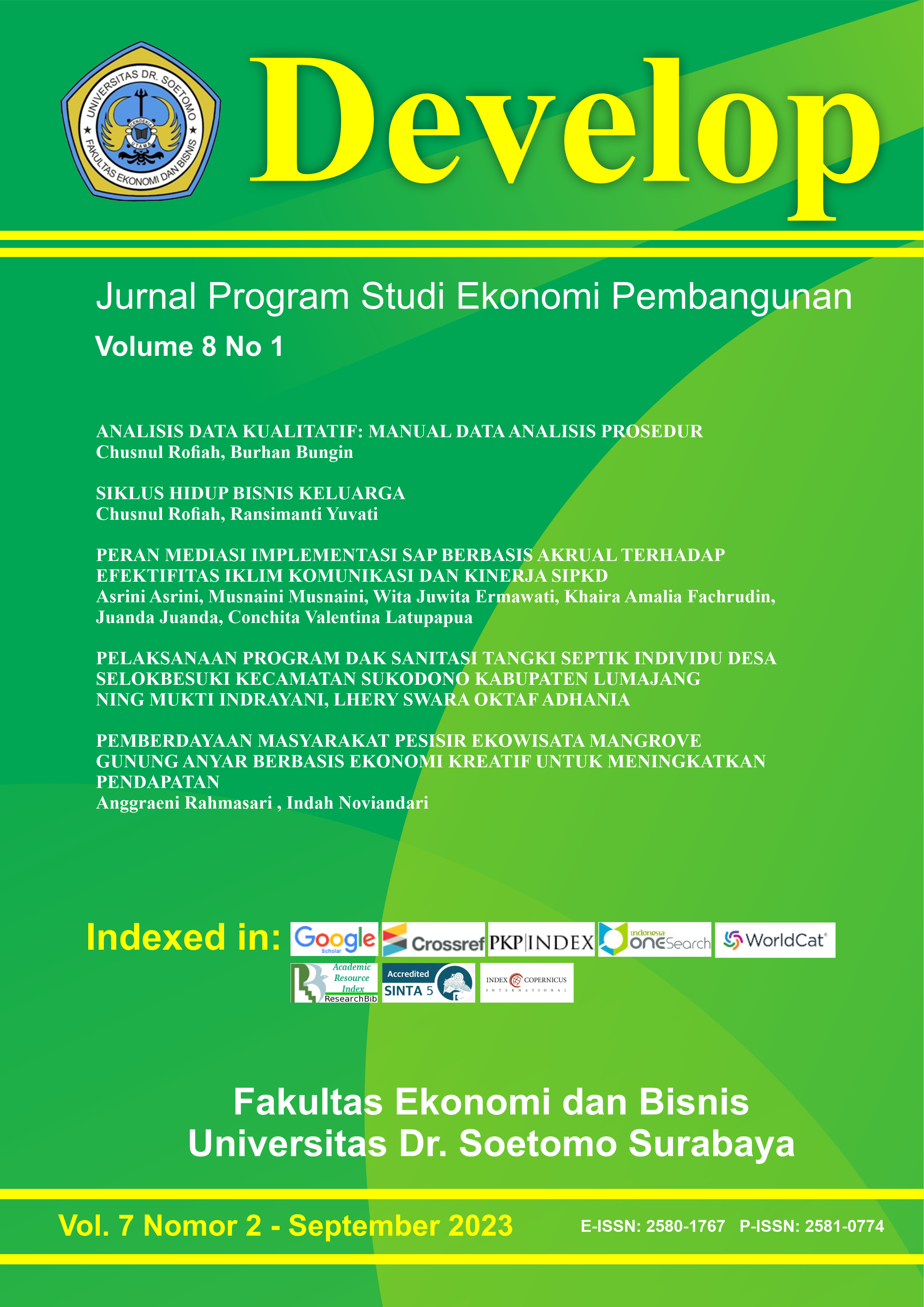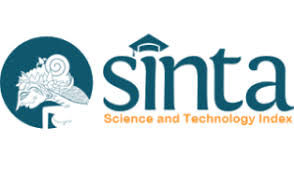SIKLUS HIDUP BISNIS KELUARGA
 Abstract views: 295
,
Abstract views: 295
,
 PDF Journal downloads: 756
PDF Journal downloads: 756
Abstract
The internal dynamics of business families show that family firms are unique in their learning opportunities and educational needs for various reasons: (1) the long time span of family involvement in the business (2) the participating parties have different interests and roles for each to play. in companies and families everything is important to the company's functioning of the business (3) members of the same family work together, they may experience strong emotions from filial love and parental altruism, to personal hostility stemming from early sibling rivalry. The focus of our research is on concentrating on matters of complexity and scale, where the family plays a major management and ownership role, and where there is an intention to do so maintain constancy within the family. With a phenomenological approach and the object of our research is a gold shop in Jombang which has reached 3 generations and was founded in 1948. Using manual data analysis procedures, this research found that in maintaining the life cycle of a family business there are two main points: (1) family business managed by family members and in important positions, familiar with the business environment so that generational transfer can be prepared gradually, without coercion and careers proceed according to indirect procedures at the top level. (2) a marketing strategy which requires flexibility in work patterns, time and network expansion. Apart from that, it must also keep up with the times by prioritizing customer satisfaction so that it will create positive communication and don't forget to innovate by not carrying out centralized control and must maintain a good name.
References
Agarwal, R., Mittal, N., Patterson, E., & Giorcelli, M. (2021). Evolution of the Indian LPG industry: Exploring conditions for public sector business model innovation. Research Policy, 50(4), 104196.
Ahmad, S., Siddiqui, K. A., & AboAlsamh, H. M. (2020). Family SMEs’ survival: the role of owner family and corporate social responsibility. Journal of Small Business and Enterprise Development, 27(2), 281–297.
Alsos, G. A., Clausen, T. H., Hytti, U., & Solvoll, S. (2019). Entrepreneurs’ social identity and the preference of causal and effectual behaviours in start-up processes. In Entrepreneurial Identity and Identity Work (hal. 58–82). Routledge.
Arcese, G., Valeri, M., Poponi, S., & Elmo, G. C. (2021). Innovative drivers for family business models in tourism. Journal of Family Business Management, 11(4), 402–422.
Bagheri, M., Baum, T., Ebrahimi, A., & Abbasi, A. (2020). Talent management in the tourism and hospitality industry: evidence from Iran. Anatolia, 31(1), 88-98.
Bang, N. P., Ray, S., & Kumar, S. (2023). Women in family business research—What we know and what we should know? Journal of Business Research, 164, 113990.
Bennedsen, M., Lu, Y., & Mehrotra, V. (2022). A survey of Asian family business research. Asia‐Pacific Journal of Financial Studies, 51(1), 7–43.
Birdthistle, N., & Hales, R. (2023). What It Means to Be a Family Business Today. In Attaining the 2030 Sustainable Development Goal of Sustainable Cities and Communities (hal. 11–21). Emerald Publishing Limited.
Bövers, J., & Hoon, C. (2020). Shared leadership at the top of family firms: how sibling teams engage in successful co-leadership. Entrepreneurship and Family Business Vitality: Surviving and Flourishing in the Long Term, 113–132.
Calabrò, A., Vecchiarini, M., Gast, J., Campopiano, G., De Massis, A., & Kraus, S. (2019). Innovation in family firms: A systematic literature review and guidance for future research. International journal of management reviews, 21(3), 317–355.
Chusnul Rofiah, S. E. (2023). METODE PENELITIAN KUALITATIF Lengkap dengan Rencana Pembelajaran Semester dan Contoh Pedoman Penulisan Skripsi Kualitatif. CV Literasi Nusantara Abadi.
Conz, E., & Magnani, G. (2020). A dynamic perspective on the resilience of firms: A systematic literature review and a framework for future research. European Management Journal, 38(3), 400–412.
Cosson, B., & Gilding, M. (2021). “Over My Dead Body”: Wives’ Influence in Family Business Succession. Family Business Review, 34(4), 385–403.
De Massis, A., Kotlar, J., & Manelli, L. (2021). Family firms, family boundary organizations, and the family-related organizational ecosystem. In Family Business Review (Vol. 34, Nomor 4, hal. 350–364). SAGE Publications Sage CA: Los Angeles, CA.
Erdogan, I., Rondi, E., & De Massis, A. (2020). Managing the tradition and innovation paradox in family firms: A family imprinting perspective. Entrepreneurship theory and practice, 44(1), 20–54.
Ferasso, M., Beliaeva, T., Kraus, S., Clauss, T., & Ribeiro‐Soriano, D. (2020). Circular economy business models: The state of research and avenues ahead. Business Strategy and the Environment, 29(8), 3006–3024.
Gieure, C., del Mar Benavides-Espinosa, M., & Roig-Dobón, S. (2020). The entrepreneurial process: The link between intentions and behavior. Journal of Business Research, 112, 541–548.
Hennink, M., Hutter, I., & Bailey, A. (2020). Qualitative research methods. Sage.
Hernández-Linares, R., Diaz-Moriana, V., & Sanchez-Famoso, V. (2022). Managing paradoxes in family firms: a closer look at public politics in Spain. In Family Business Debates: Multidimensional Perspectives Across Countries, Continents and Geo-political Frontiers (hal. 225–241). Emerald Publishing Limited.
Iser, W. (2022). The reading process: A phenomenological approach. In New directions in literary history (hal. 125–145). Routledge.
Jahmurataj, V., Ramadani, V., Bexheti, A., Rexhepi, G., Abazi-Alili, H., & Krasniqi, B. A. (2023). Unveiling the determining factors of family business longevity: Evidence from Kosovo. Journal of Business Research, 159, 113745.
Jatmiko, R. D. (2004). Manajemen Stratejik (1 Cet. 2). UMM Press.
Kleve, H., Köllner, T., von Schlippe, A., & Rüsen, T. A. (2020). The business family 3.0: Dynastic business families as families, organizations and networks—Outline of a theory extension. Systems Research and Behavioral Science, 37(3), 516–526.
Kraus, S., Clauss, T., Breier, M., Gast, J., Zardini, A., & Tiberius, V. (2020). The economics of COVID-19: initial empirical evidence on how family firms in five European countries cope with the corona crisis. International journal of entrepreneurial behavior & research, 26(5), 1067–1092.
Krueger, N., Bogers, M. L. A. M., Labaki, R., & Basco, R. (2021). Advancing family business science through context theorizing: The case of the Arab world. Journal of Family Business Strategy, 12(1), 100377.
Kuratko, D. F., Fisher, G., & Audretsch, D. B. (2021). Unraveling the entrepreneurial mindset. Small Business Economics, 57, 1681–1691.
Le Breton-Miller, I., & Miller, D. (2022). Family businesses under COVID-19: Inspiring models–Sometimes. Journal of Family Business Strategy, 13(2), 100452.
Leotta, A., Rizza, C., & Ruggeri, D. (2020). An Overview of Family Business. Profiles, Definitions and the Main Challenges of the Business Life Cycle. Management Controlling and Governance of Family Businesses: Theoretical Insights and Empirical Evidence from Italy, 7–28.
Parker, C., Scott, S., & Geddes, A. (2019). Snowball sampling. SAGE research methods foundations.
Rofiah, C., & Bungin, B. (2021). Qualitative Methods: Simple Research With Triangulation Theory Design. Develop, 5(1), 18–28.
Rondi, E., De Massis, A., & Kotlar, J. (2019). Unlocking innovation potential: A typology of family business innovation postures and the critical role of the family system. Journal of family business strategy, 10(4), 100236.
Rovelli, P., Ferasso, M., De Massis, A., & Kraus, S. (2022). Thirty years of research in family business journals: Status quo and future directions. Journal of Family Business Strategy, 13(3), 100422.
Salam, M. T., Imtiaz, H., & Burhan, M. (2021). The perceptions of SME retailers towards the usage of social media marketing amid COVID-19 crisis. Journal of Entrepreneurship in Emerging Economies, 13(4), 588-605.
Salloum, C., Digout, J., Salloum, L., Mercier-Suissa, C., & Chahine, P. (2021). Family business, strategic planning and corporate entrepreneurship. International Journal of Entrepreneurship and Innovation Management, 25(1), 52–71.
Samara, G. (2021). Family businesses in the Arab Middle East: What do we know and where should we go? Journal of Family Business Strategy, 12(3), 100359.
Samara, G., Jamali, D., & Parada, M. J. (2021). Antecedents and outcomes of bifurcated compensation in family firms: A multilevel view. Human Resource Management Review, 31(1), 100728.
Scalzo, G., & Ramírez-Pérez, H. X. (2020). Virtue ethics: A contribution to family firms. In Strategy, Power and CSR: Practices and Challenges in Organizational Management (hal. 279–294). Emerald Publishing Limited.
Scholes, L., Hughes, M., Wright, M., De Massis, A., & Kotlar, J. (2021). Family management and family guardianship: Governance effects on family firm innovation strategy. Journal of Family Business Strategy, 12(4), 100389.
Sorrentino, G., Situm, M., & Märk, S. (2023). State of research on family businesses and the corporate brand: current findings, future fields of research and approaches to strategic use. In Research Handbook on Entrepreneurship and Innovation in Family Firms (hal. 38–59). Edward Elgar Publishing.
Tirdasari, N. L., & Dhewanto, W. (2020). When is the right time for succession? Multiple cases of family businesses in Indonesia. Journal of Family Business Management, 10(4), 349–359.
Tobak, J., & Nábrádi, A. (2020). The TONA model: A New methodology for assessing the development and maturity life cycles of family owned enterprises. Journal of Innovation & Knowledge, 5(4), 236–243.
von Schlippe, A., & Groth, T. (2023). Company, Family, Business Family: Systems-Theoretical Perspectives on the Extension of Three-Circle Thinking. In Sociology of the Business Family (hal. 259–269). Springer.
von Schlippe, A., Rüsen, T. A., Groth, T., von Schlippe, A., Rüsen, T. A., & Groth, T. (2021). Family Strategy over Generations. The Two Sides of the Business Family: Governance and Strategy Across Generations, 3–27.
Xu, K., Hitt, M. A., & Dai, L. (2020). International diversification of family-dominant firms: Integrating socioemotional wealth and behavioral theory of the firm. Journal of World Business, 55(3), 101071.
Xu, K., Hitt, M. A., & Miller, S. R. (2020). The ownership structure contingency in the sequential international entry mode decision process: Family owners and institutional investors in family-dominant versus family-influenced firms. Journal of international business studies, 51, 151–171.
CC BY 4.0 Creative Commons Attribution 4.0 International. This license requires that reusers give credit to the creator. It allows reusers to distribute, remix, adapt, and build upon the material in any medium or format, even for commercial purposes.
BY: Credit must be given to you, the creator.



2.png)






